
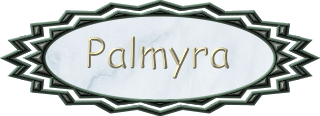

1858
James and Hannah Lowe and Family
 Port of London, England |
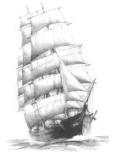
|
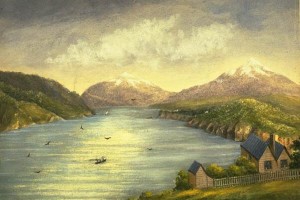 Port Chalmers, New Zealand |
|
The Palmyra sailed from London for Dunedin on 28th October 1857. It arrived on February 14 1858. It weighed 706 tons and the captain was John Tierney. Nine deaths occurred on the voyage - Mr Bateman, Mrs Docherty, and 7 children - and one girl since arrival in port. There were 7 births. The number on board at arrival was 300. Among the steerage passengers were James and Hannah Lowe nee Green, and their two children Annie and John. On board also were 3 cases agricultural machinery, 4 cases of implements, 1 case of stationery, 7 packages building materials, 64 packages for wooden houses, 100 tons coal, 13 packets hops, 1 case preserves, 1 case of cordials, 36 packages of wire, 1 crate hair felt, 199 cases wire, 14 casks brick, 1276 iron rails, 850 iron sleepers, 16 kegs nails, 257 bars, 47 bundles iron, 167 cases, 17 crates, 9 casks, 16 barrels, 1 tierce, 9 crates, 1 truss, 14 bales, 69 packages and 2 boxes. The following is from the paper Colonists: "The Palmyra left Gravesend on the 28th, and the Downs on the 31at of October, and after a good run down the Channel experienced constant south westerly winds until reaching the northern tropic, where she caught the trades, which continued steady but light to the Equator, which was crossed on the 14th of December. Passed the Cape on the 8th of January, and made the south-west point of the Middle Island on the 12th of February. Hove to in Foveaux Straits during the night, and passed between Bluff Harbour and Dog Island next morning. Becalmed till noon of the 14th, when a smart breeze sprang up, and carried the vessel to the Heads, outside which she anchored at half-past 5. p.m., but could not get to Port Chalmers until the 19th. The voyage occupied 105 days, from the Line 64 days, and from the Cape 36. The chronometers were much out of order, which caused a delay of 36 hours in making land. The weather was generally fine during the passage, no spars having been lost, although a good many sails were split." William Stanbury, Chief Officer of the barque Palmyra, was charged at Dunedin by John Tierney, Master of this barque, with stealing from a cask in the storeroom of said barque, one quart or thereby of Rum, on Sunday the 10th day of January last. Prisoner was dismissed. John Tierney, master of the barque Palmyra, now in the port of Otago, was charged on the information of Charles Logie, Esq., Collector of Customs at Otago, with committing a breach of clauses 22,27, 32, 36,38, and 62 of the "Passengers' Act, 1855." Captain Tierney was found guilty upon three of the charges made against him, and was fined £30. |
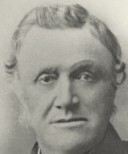 James Lowe |
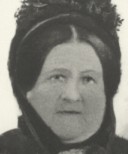 Hannah Lowe |
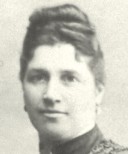 Annie Lowe |
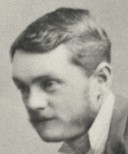 John William Lowe |

|
Click here for the "Palmyra" Passenger List |

|
The Early Settlers Museum in Dunedin has a number of letters written by passengers on the Palmyra recalling the trip out.
This first recollection was written in 1928: The good old ship Palmyra landed in Port Chalmers in the beginning of 1858 after a very long journey of 120 days. The death of Pilot Driver brought forcibly to my mind our entrance into Port Otago. The four stalwart Maoris who composed his crew greatly interested all on board - our arrival opposite Port Chalmers was marked by an incident which will still be remembered by the survivors for arriving at our anchorage one of our cables parted with the result that the stern of the Palmyra swung round and smacked the Highland man who kept guard on the bow of the Strathallan. The panic that ensued was considerable. Some of the women folks fainting and wringing of hands till matters were righted. Then our troubles were only beginning as the old Hughon Bell landed us on a sandbank and kept us there till the tide floated us off again. I often think what a large gathering could have been got together from the three ships - Robert Henderson, Strathallan and Palmyra while all landed in Port Chalmers within two weeks of one another - a good many of our fathers and mothers have passed away but I still come across many. I have only penned these few remarks with the view of drawing out if possible more able accounts from some of the older people as I was only about eight years old then and have only what I remember. I am satisfied that we could get some very readable articles which would bring the old days to mind. I think the Palmyra carried about 300 passengers. My father James Hislop brought wife and nine boys and girls - that number could now be out numbered by a good many nines. Yours Truly, A. Hislop Another account of the voyage was written in 1903: Forty-five years today (14th February 1903) the American-built barque "Palmyra", 702 tons register, Captain Tierney (Dublin) arrived off Otago Heads, from London, with some 300 immigrants - English, Irish and Scotch. The Scotch were mostly from the Shires of Perth, Aberdeen and Inverness and the Kingdom o' Fife. Being a youth of ten years of age then I cannot, altogether, give you accurate information relating to our voyage, which occupied 108 days from Gravesend to Taiaroa Heads. We came through the Straits, and when passing the Bluff, we saw the barque William Hyde, stranded, lying inside the harbour. We came along the coast to close inshore, so much so, that we could see lights from some of the huts or whares in Port Molyneux - in fact, we were becalmed off there. The voyage was rather an exciting one in some respects: any amount of fighting, which of course - to the youths on board - was looked on as fine fun. There was the brighter and livelier side of the picture by way of dancing in the fine evenings; and during the day, the Auld Scotty's (with due respect to them) amused themselves by playing the "Dam", or "Damned Board", to pass away the time. Broaching the cargo was another favourite pastime with a few of the passengers. I, innocently, assisted in holding a "naked" candle while the operation was going on. The chief mate (Stanbury), threatened to "blow" the ship up, for which he was court-marshalled, and was committed - not to a "dungeon-cell" - but into one of the cabin passenger's W.C's. "Crossing the line", varied matters for one day; when I, with a few more of the small-fry, looked down from the lower fore-rigging (monkey-fashion), upon the scene of father "Neptune" coming onboard; when afterwards, he was mounted on the Port gun-carriage and wheeled in triumph around the ship. Afterwards, the "duck-pond", on the starboard side, was called into requisition, for the purpose of giving those who had gone through the process of being "shaved", with some blunt instrument, and for a "lather", tar and soap, a chance of "scraping" down; which also reminds me of a few of the passengers hovering around the mainmast during the "Duke of Argyle". We were nearly wrecked when off the Canaries; the look out, apparently, having gone to sleep. However, a calamity was arrested by Robert Gartshore, now of Russell Street; he having gone on deck early in the morning to have a smoke, when he at once noticed our position, and reported accordingly. The younger members of the ship were half-starved, at least I was, often going to the gallery for a "smell" of pea soup, boiled "salt-pork" and a few other highly-flavoured eatables, including of course, "plum duff" with treacle sauce - a sauce well known to those who arrived in the early days. We had a narrow "save" at the "Heads", when well I remember the late "Dick" Driver springing onboard and rushing on to the "poop", which was the means, I suppose, from saving us from total destruction. After arriving at Port Chalmers, my father's family, along with some thirty other passengers, were the last to leave the Palmyra for Dunedin, transhipping to the sloop "Bloomer", Captain Malcolm, with his mate "German Charlie". We left Carey's Bay about 2 o'clock in the afternoon and sailed up the "short" channel, sometime towed by the dingy, and arriving at the jetty, Jetty Street, at 10 o'clock in the evening. We (our family), we were at once escorted to, and accommodated at the Commercial Hotel, High Street, which was then "run" by the late George Duncan, with the assistance of John Wain, who, I believe, was "head-man" and waiter... I am etc, Andrew Walker Bremner |

 |
Return to Lowe page Return to Green page |